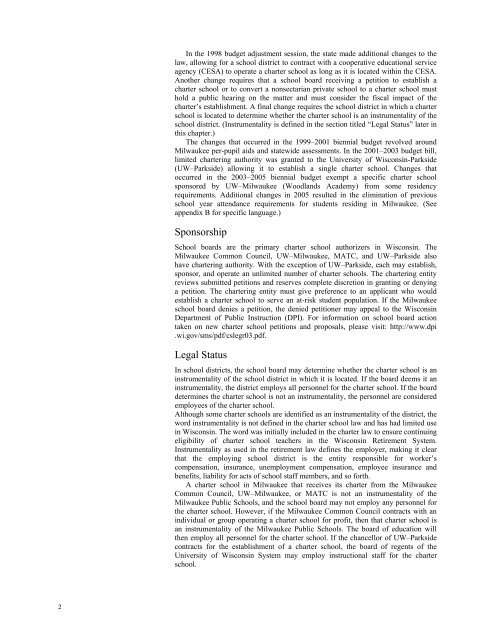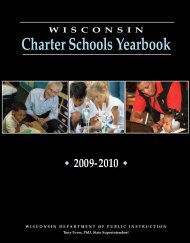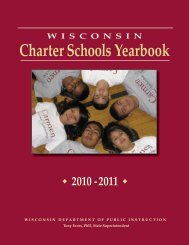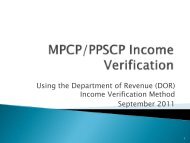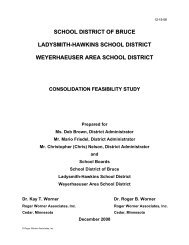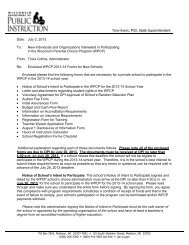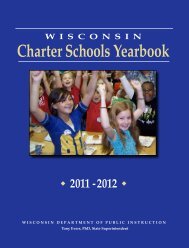Wisconsin Charter Schools Yearbook - School Management Services
Wisconsin Charter Schools Yearbook - School Management Services
Wisconsin Charter Schools Yearbook - School Management Services
Create successful ePaper yourself
Turn your PDF publications into a flip-book with our unique Google optimized e-Paper software.
2<br />
In the 1998 budget adjustment session, the state made additional changes to the<br />
law, allowing for a school district to contract with a cooperative educational service<br />
agency (CESA) to operate a charter school as long as it is located within the CESA.<br />
Another change requires that a school board receiving a petition to establish a<br />
charter school or to convert a nonsectarian private school to a charter school must<br />
hold a public hearing on the matter and must consider the fiscal impact of the<br />
charter’s establishment. A final change requires the school district in which a charter<br />
school is located to determine whether the charter school is an instrumentality of the<br />
school district. (Instrumentality is defined in the section titled “Legal Status” later in<br />
this chapter.)<br />
The changes that occurred in the 1999–2001 biennial budget revolved around<br />
Milwaukee per-pupil aids and statewide assessments. In the 2001–2003 budget bill,<br />
limited chartering authority was granted to the University of <strong>Wisconsin</strong>-Parkside<br />
(UW–Parkside) allowing it to establish a single charter school. Changes that<br />
occurred in the 2003–2005 biennial budget exempt a specific charter school<br />
sponsored by UW–Milwaukee (Woodlands Academy) from some residency<br />
requirements. Additional changes in 2005 resulted in the elimination of previous<br />
school year attendance requirements for students residing in Milwaukee. (See<br />
appendix B for specific language.)<br />
Sponsorship<br />
<strong>School</strong> boards are the primary charter school authorizers in <strong>Wisconsin</strong>. The<br />
Milwaukee Common Council, UW–Milwaukee, MATC, and UW–Parkside also<br />
have chartering authority. With the exception of UW–Parkside, each may establish,<br />
sponsor, and operate an unlimited number of charter schools. The chartering entity<br />
reviews submitted petitions and reserves complete discretion in granting or denying<br />
a petition. The chartering entity must give preference to an applicant who would<br />
establish a charter school to serve an at-risk student population. If the Milwaukee<br />
school board denies a petition, the denied petitioner may appeal to the <strong>Wisconsin</strong><br />
Department of Public Instruction (DPI). For information on school board action<br />
taken on new charter school petitions and proposals, please visit: http://www.dpi<br />
.wi.gov/sms/pdf/cslegr03.pdf.<br />
Legal Status<br />
In school districts, the school board may determine whether the charter school is an<br />
instrumentality of the school district in which it is located. If the board deems it an<br />
instrumentality, the district employs all personnel for the charter school. If the board<br />
determines the charter school is not an instrumentality, the personnel are considered<br />
employees of the charter school.<br />
Although some charter schools are identified as an instrumentality of the district, the<br />
word instrumentality is not defined in the charter school law and has had limited use<br />
in <strong>Wisconsin</strong>. The word was initially included in the charter law to ensure continuing<br />
eligibility of charter school teachers in the <strong>Wisconsin</strong> Retirement System.<br />
Instrumentality as used in the retirement law defines the employer, making it clear<br />
that the employing school district is the entity responsible for worker’s<br />
compensation, insurance, unemployment compensation, employee insurance and<br />
benefits, liability for acts of school staff members, and so forth.<br />
A charter school in Milwaukee that receives its charter from the Milwaukee<br />
Common Council, UW–Milwaukee, or MATC is not an instrumentality of the<br />
Milwaukee Public <strong><strong>School</strong>s</strong>, and the school board may not employ any personnel for<br />
the charter school. However, if the Milwaukee Common Council contracts with an<br />
individual or group operating a charter school for profit, then that charter school is<br />
an instrumentality of the Milwaukee Public <strong><strong>School</strong>s</strong>. The board of education will<br />
then employ all personnel for the charter school. If the chancellor of UW–Parkside<br />
contracts for the establishment of a charter school, the board of regents of the<br />
University of <strong>Wisconsin</strong> System may employ instructional staff for the charter<br />
school.


